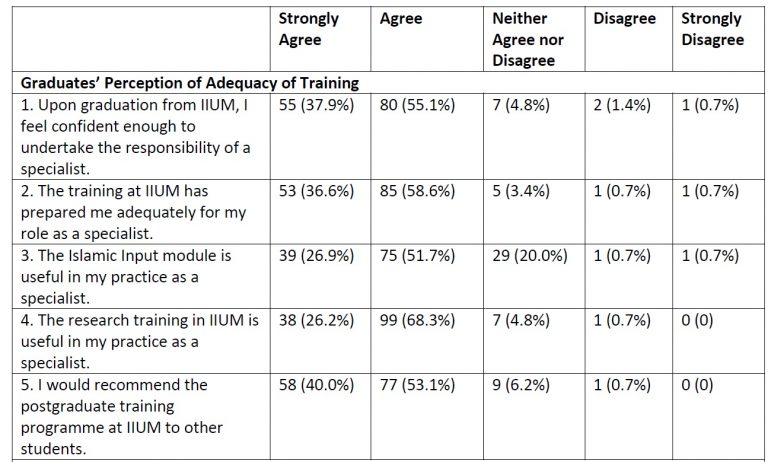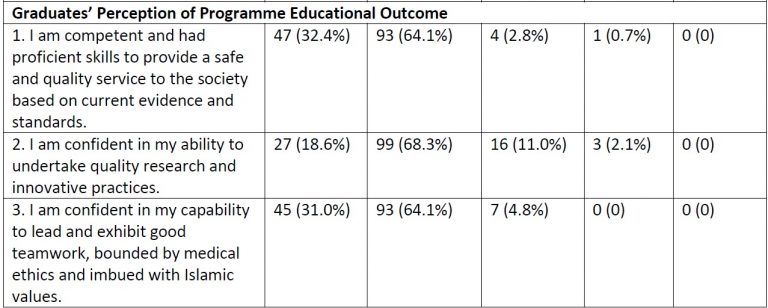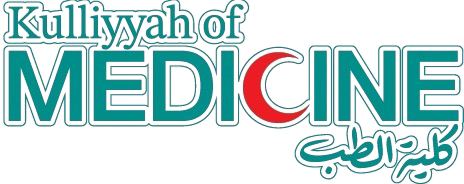Kulliyyah of Medicine Graduates’ Survey Analysis 2021
In the year 2021, the Postgraduate Office launched a survey involving all graduates of the Postgraduate Programme in the Kulliyyah. The objective of the survey is to ascertain the feedback of the graduates on improving the programme. A total of 145 graduates responded to the survey. Out of 298 graduates since its inception, yield a percentage of 48.7% responders. The response rate was higher for graduates of the Clinical Specialist Training programme (67.6% = 117/173), compared to the Master and PhD programme of 13.6% (28/206). Several factors that may contribute to the low response rate for Master and PhD programmes include most are international graduates from other countries, with graduates spanning over the past 20 years as the programmes started in 2000. These factors result in difficulty in reaching the graduates to fill in the survey, hence the low response rate compared to the Clinical Specialist Training programmes where the majority are local graduates. Of the responders, 79 (45.5%) were male, and 120 (82.8%) were married. Ethnicity comprises of 118 (81.3%) Malay, 13 (9.0%) Chinese, 8 (5.5%) Indian, and 6 (4.1%) from overseas.
Table 1 shows the response to specific questions exploring the graduates’ perception of the adequacy of training in IIUM. Upon being asked about the confidence to undertake the responsibility of a specialist upon graduation, the majority i.e. 135 (93.1%) either strongly agree or agree. The subsequent question embarked on the programmes’ ability to prepare the students for their role as a specialist, of which 138 (95.2%) either strongly agree or agree. Specific components of the training, including the Islamic input module and research training module, were further explored. A lesser percentage of 78.6% (n=114) either strongly agree or agree, whilst 29 (20.0%) neither disagree nor agree, and 2 (1.4%) disagree that the Islamic input module is useful in their practice as a specialist. When we looked further at the 31 students, 7 (25.0%) were from the research Master and PhD programme, and 24 (20.5%) were from the Clinical Specialist Training programme. Before 2021, the Islamic input module for the Master and PhD programme was conducted as formal classes in the department, whereas for the Clinical Specialist Training programme, the module was conducted as a two-day interactive seminar. The delivery of the programme content may influence the difference. It is also of interest to note that the survey was conducted before the implementation of the new structured course of Islamisation of Human Knowledge. We hope with the delivery of a more structured programme, a higher impact of this module could be produced in their future practice. In regards to the research module, a total of 137 (94.5%) either strongly agree or agree that the research module is useful in their practice as a specialist. This is important as research training provides an integral part of evidence-based medicine in their daily clinical practice.
The overall perception of the training in IIUM is also encouraging. When asked whether they would recommend the postgraduate training programme at IIUM to other potential students, 58 (40.0%) strongly agree, 77 (53.1%) agree, 9 (6.2%) neither disagree nor agree and 1 (0.7%) disagree. We further asked the graduates to elaborate on the area of improvement. Amongst the area addressed by the graduates are mentorship, incorporation of communication modules and professionalism in the curriculum, and an exchange programme with overseas hospitals or universities. In addition, several graduates suggested more exposure to various laboratory expertise, various subspecialties and research opportunities. Graduates were also asked about the main challenges that they encountered while studying at IIUM. This could help the administrator in providing support to future students in overcoming the challenges. The issues highlighted include family separation issues, completion of research component during busy clinical duties and academic workload, time management between clinical and academic demand, research funding, uncertainties during the COVID-19 pandemic, and networking with other universities. The issues have been highlighted for further improvement to provide holistic support to future students.
The final part of the questionnaire explores the graduates’ perception of the Programme’s Educational Outcome (PEO). Five areas were explored, which include (1) competency and skills to provide a safe and quality service, (2) ability to undertake quality research and innovative practices, (3) capability to lead and exhibit good teamwork, (4) pursuant of lifelong learning and utilising the latest technologies, and (5) contribution towards sustainable development for the betterment of society. The overall graduates’ responses are tabulated in Table 1. A majority of graduates (96.5%) either strongly agree or agree that they are competent and had proficient skills to provide a safe and quality service to the society based on current evidence and standard. A lesser percentage of graduates (86.9%) either strongly agree or agree that they are confident in their ability to undertake quality research and innovative practices. Of note, 16 (11.0%) neither agree nor disagree, and 3 (2.1%) disagree. In assessing the graduates’ confidence in their capability to lead and exhibit good teamwork, bounded by medical ethics and imbued with Islamic values, 95.2% either strongly agree or agree. More than 97% of graduates either strongly agree or agree on the final two of the PEO on lifelong learning and contribution towards sustainable development.
Although the result of the survey looks encouraging, several issues were raised by the graduates regarding the challenges faced during their study at IIUM and suggestions for improvement can be addressed to further improve our postgraduate programme in the Kulliyyah. The main issues that need to be addressed are the research and Islamic input components of the programmes. Efforts have been placed both by each department and the Postgraduate Office to improve the delivery of these components in
the curriculum. This survey is valuable to provide feedback and can be periodically assessed after the implementation of changes to evaluate the impact of changes. This is part of a Continuous Quality Improvement (CQI) initiative, to evaluate the learning outcomes, learning activities, and learning assessment against the outcome of the programme. In addition, periodic curriculum reviews by the programme providers should be guided by these CQI initiatives.
Table 1: Postgraduate Survey 2021 by the Kulliyyah of Medicine



